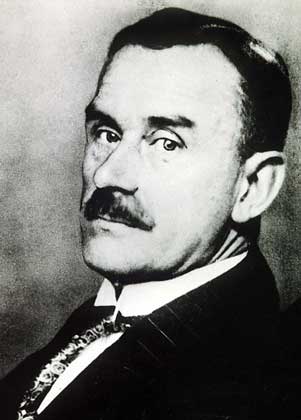The directory «Plots»
Mann Thomas
(1875–1955)

German novelist and essayist, the outstanding German novelist of the 20th cent., b. Lübeck; brother of Heinrich Mann. A writer of great intellectual breadth, Mann developed literary themes that not only delved into the inner self but also related inner problems to changing European cultural values. To coordinate this dual focus Mann often wrote in a symbolic vein, although in general he was less experimental than many of his contemporaries.
Mann became famous with the publication of his first novel, Buddenbrooks (1901, tr. 1924), which depicts the rise and disintegration of a merchant family. Shorter works of fiction followed, among them Tonio Kröger (1903, tr. 1913–15); the verse drama Fiorenza (1905); and the classic Der Tod in Venedig (1912, tr. Death in Venice, 1925), a novella in which the hero, a great writer, falls prey to an uncontrolled passion, weakens, and eventually dies. These works show Mann’s preoccupation with the interaction of cultural and psychological problems. The proximity of creative art to neurosis and the affinity of genius and disease are his largest themes, along with a strong interest in the nature of repressed, often homoerotic sexual desires.
Artistic values in a bourgeois society is a main theme in his rather comic second novel, Königliche Hoheit (1909, tr. Royal Highness, 1916). Among Mann’s other important shorter works of fiction are Unordnung und frühes Leid (1925, tr. Early Sorrow, 1929), a story; and the short novel Mario und der Zauberer (1930, tr. Mario and the Magician, 1930), an allegorical attack on fascism.
Translations of his shorter fiction are collected in Stories of Three Decades (1936). Mann’s third novel, Der Zauberberg (1924, tr. The Magic Mountain, 1927, 1995), occupied him for 12 years. Here the protagonist is a young man from a middle-class background who, after spending seven years in the midst of discussions of disease and death in a tuberculosis sanatorium, finds fulfillment in leaving to re-enter the larger world.
Mann then began his tetralogy Joseph und seine Brüder (1933–43, tr. Joseph and His Brothers, 1934–44), on which he worked intermittently for 16 years. This erudite and detailed recreation of the biblical story of Joseph is a brilliant study of the psychological and the mythological. In Doctor Faustus (1947, tr. 1948), Mann used the Faust motif to delve into the conflict between spirituality and sensuality. His last works include the novels Der Erwählte (1951, tr. The Holy Sinner, 1951) and Bekenntnisse des Hochstaplers Felix Krull (1954, tr. Confessions of Felix Krull, Confidence Man, 1955), a picaresque comedy adapted from an earlier fragment.
Mann’s essays fall into two general categories—political and literary. His autobiographical essay Betrachtungen eines Unpolitischen (1918, tr., Reflections of a Nonpolitical Man, 1983) marks his decision that the artist must participate in politics in order to preserve a creative society; Mann later became an outspoken critic of fascism. Translations of his major political speeches and essays are published in Order of the Day (1942). Mann’s own selection of his literary essays appeared in English as Essays of Three Decades (1947). These elaborate the recurrent themes of his fiction through studies of thinkers who influenced him.
Mann left (1933) Hitler’s Germany for Switzerland in self-imposed exile, was deprived (1936) of his citizenship by the Nazis, and after 1938 lived in the United States until he returned to Switzerland in 1953. Despite his roots in romanticism, Mann was a skeptical rationalist who opposed the anti-intellectualism of many 20th-century German theorists. Mann was awarded the 1929 Nobel Prize in Literature.
Comoren Islands, 1977, Nobel prize winners
DDR, 1956, Thomas Mann
DDR, 1975, Thomas Mann
Gambia, 1995, Thomas Mann
German Federal Republic, 1956, Thomas Mann
German Federal Republic, 1978, Gerhart Hauptmann, Hermann Hesse, Thomas Mann
Guinea, 2009, Writers
Guinea Bissau, 2008, Thomas Mann, Kurt Vonnegut
Macedonia, 2001, Nobel, Names of writers
Mauritanie, 1977, Thomas Mann
Paraguay, 1977, Medal of Nobel prize of Literature
Portugal, 2000, Writers
Sierra Leone, 1986, Statue of Liberty; Walt Witman, Thomas Mann
St. Vincent, 1995, Thomas Mann
Switzerland, 1979, Thomas Mann
Tuvalu, 2005, Albert Einstein and Thomas Mann
USSR, 1973,  Thomas Mann museum in Neringa-Nida
Thomas Mann museum in Neringa-Nida
USSR, 1973.10.23,  House of Thomas Mann in Neringa
House of Thomas Mann in Neringa
USSR, 1977.10.13,  House of Thomas Mann in Neringa
House of Thomas Mann in Neringa